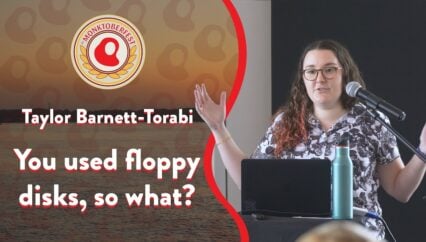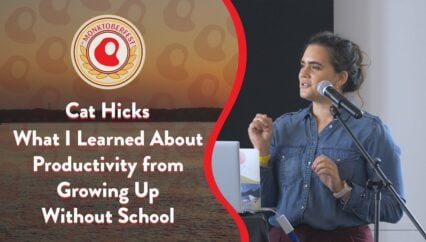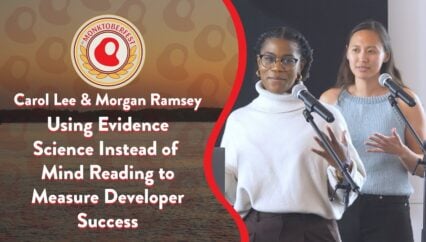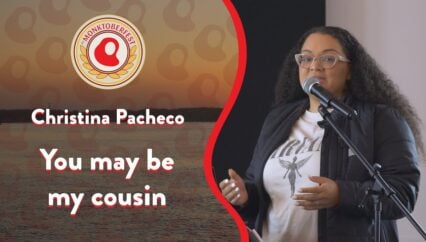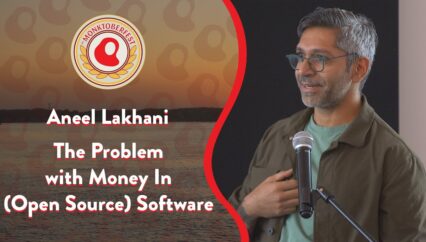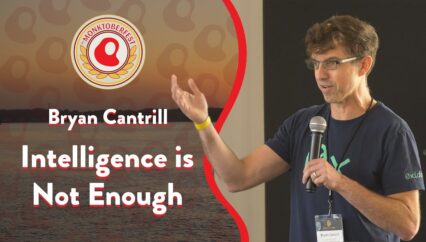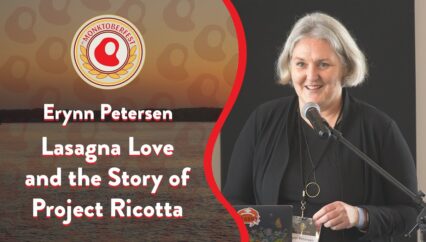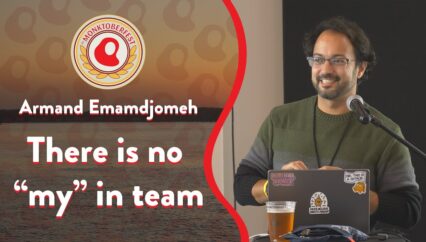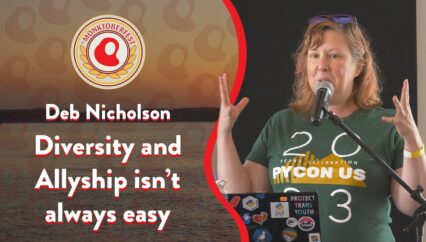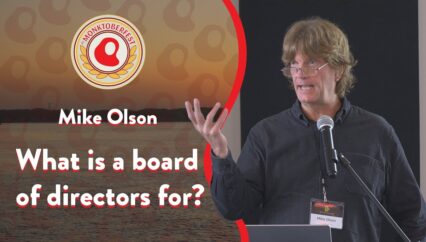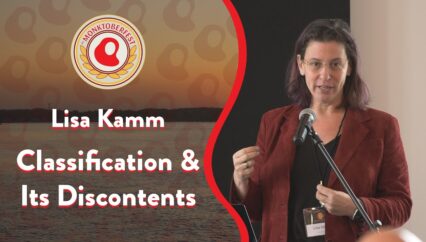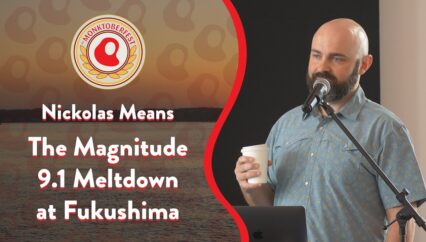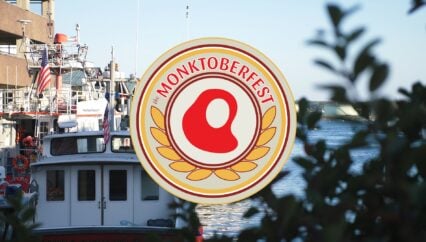Sometimes in life, there are moments that let us step back and see things more clearly. This talk is about one such moment, that threw the past, present and future into sharp relief. This is a vulnerable talk about both the need to recognize your own agency and the need to accept help. It’s a talk about overcoming. And perhaps most importantly, it’s a talk that reminds you that whatever your obstacles, whatever your challenges, you are not alone.
Transcript
There are moments in each of our lives unexpected pivotal moments, when the unwanted, quiet truths of our lives make themselves known. In hi my life there have been maybe half a dozen of these moments, at least those are the moments that I recognized as momentous while they were happening.
And I’m not talking about graduations, or weddings, or even the births of our children. Those are all pivotal moments, but they are planned and curated. We intend those moments. To be memories, and create ceremony around them.
What I am talking about is something entirely different. When the universe decides to rip the floor out from under you, shake your very foundation, to test your principles, to collapse relationships, and change the direction of your life.
I believe there’s an equilibrium to life and that humans favor balance. The ancient Egyptians believe that after life the person was guided to the afterlife to Miedus, a righteous heart that was equal in weight to a feather and I love that image, a perfectly balanced scale, denoting the bigness of a person, I wish life were that balanced, this ever-present equilibrium, but it isn’t. Life is the moon, waxing and waning, it’s the ocean, ebbing and flowing. Life pushes and pulls in a rhythm that none of us control. We are observers of this movement, occasionally tossed about with the whims of a tempo, unsure of which way is up.
For me, I choked on a piece of chicken. Fried chicken, to be very specific, which I love, but this particular piece tried to kill me and I didn’t appreciate that.
It sat stuck in my throat just about here, and while I could still sort of breathe, I could feel it painfully lodged in my throat.
My back was too the restaurant, the busy scene of families and loved ones gathering together and eating. My now ex-husband sat across from me in the booth, his back to the window. I looked at him with what must have been sheer terror, smeared across my face.
His stare in response was blank, unmoved. I thought maybe I could force the chicken out by vomiting, so I scooted my chair back and I made my way through the busy restaurant to the restroom. I stood in that stall, panicking, worrying what would happen if I died, and eventually I was able to make myself throw up.
In those moments that followed that immediate relief, I expected my partner to peek his head into the restroom to check on me or send someone in to make sure I was OK. I washed my hands, I swished water in my mouth to remove the acidity of fear and bile and when no one came in, I thought sure he would be waiting outside the restroom to make sure I was OK. He wasn’t. I made my way back to the table and found him there looking at the his phone overwhelmingly unconcerned. Up to those years I had spent years in the loneliness in a struggling marriage and while it’s true I didn’t want to end my relationship for noble, even religious reasons. My deepest near was being alone. Not just alone, but a cliché, a single mother, our society’s idea, and image of helpless, poor, rejected.
But in that singular experience, I was gobsmacked with the truth that I was already on my own. I’m Emily Freeman, what an introduction. I think a lot about the intersection of humans and tech.
I got into tech for the money, because I realized that I couldn’t support my child and myself in DC on a writer’s salary.
And I’m not ashamed of that. I’m actually quite proud of it.
Rachel is going to make me cry.
This wasn’t a passion of mine from a young age. I never played video games. I wasn’t passionate about computers. I went to school for politics.
My first true love. Not engineering.
I went to code school when I was still breastfeeding my 6 month old daughter and I sat in an electrical closet someone that had set up for me to pump. I extently taught more than one 21-something man who accidentally walked in on me, for the real purpose of the booths. I wrote my first line of Ruby at 29. I learned Git and binary trees through sheer determination.
I got my first job writing Java, gave my first tech talk and overcame the endless obstacles thrown in front of people from underrepresented backgrounds and historically marginalized communities. Who despite being the global majority, continue to be shut out of many tech circles.
And I excelled. I leveraged every talent I had, every lesson I learned to run as fast as I could. But I didn’t go alone. I started alone, sure. I burned my entire life to the ground, knowing that whatever waited for me on the other side, had to be better than the harsh isolation in which I existed.
I found friends along the way, people who sat with me and taught me the very basics of using a terminal. People who gave me kind and actionable feedback on my first program, a 600-line nested loop that would make us all really sad right now. It was so bad.
People make space for me, at meetups to talk about topics I barely understood. People gave me chance after chance after chance.
I worked my ass off, but I am also an extraordinarily lucky human being.
I wonder sometimes what tech would look like if we didn’t make people fight tooth and nail just to be here, if we opened doors instead of shutting them. If we created space where people needed it and lended support. Because I would bet that I’m not the only person in this room who has overcome extraordinary odds to be here right now.
I think we all have a story. One of the few gifts of Covid is that we got a closer look inside each others’ homes, an intimate window through which to understand the often invisible constraints placed on our lives.
It was a reminder that while we may be professionals, we are people first.
We are parents. Moms, dads, step parents, we are grandparents, some of us help our kids raise their kids. Still more of us support our own parents through time and money.
Many of us have mental health challenges, anxiety, depression, ADHD, autism, or physical health. We have diabetes and autoimmune diseases and cancer. We have deaths, we have trauma, we struggle. For a thousand different reasons, we struggle. We’re human, we are beautiful. But we are awfully messy.
I believe work-life balance is bullshit. Work is part of life. For most of us, a big part. We spend a ton of time at work. About a third of our lives. Most of us will spend something around 90,000 hours at work.
For Europeans it’s at least half that.
[laughter]
90,000 hours is ten years, we will spend more time at work than we will spend with our children and just saying that makes me want to cry, because how is that not upside down?
The prevailing narrative across industry and the corporations that anchor is bring your whole self to work, just not that much. vulnerable, but not sensitive, be passionate, but don’t you dare cry. We’ve created a society where we force ourselves to divide our souls into tiny coexistent boxes. Instead of seeing ourselves as bright, magical, dynamic creatures with multiple dimensions, we create Horcruxs of ourselves. We separate all our roles into perfectly organized containers, we have the person box and the spouse box and the healthy box, the parent box, the professional box, the friend box. So many more. We have more boxes. And we have tricked ourselves into thinking only one of these boxes can be open at the same time. If we’re good, we hope the healthy box to go to the gym in the morning and then we open the professional box when we get to work, plastering a smile across our face, preparing to fix a problem caused by someone else who probably got promoted for it. We open the parenting box as soon as we’re done with work, because if we give ourselves even a moment to transition, we’re somehow dropping the ball at home and as soon as the kids go to bed, we open the partner box to connect with the primary adult with which we are attempting to maintain a relationship.
I think one of the primary contributors to unnecessary stress in our lives is this pattern of behavior, this forceful suppression of the other dimensions of our life to focus on one.
As if it were wholly separate and disconnected from the others.
I’m not saying this is our fault. We live in this society. We do, and we’re impacted by it. But it is our responsibility. Because our standards are what we tolerate and we are tolerating a society that isn’t built for us and doesn’t serve us.
It took me until I was 29 years old before I fought back, before I said enough. I deserve better. I want better.
And if I’m honest, it wasn’t even for me. It was for my daughter. I wanted better for her. I think many of us are driven by that, especially as parents, a desire to leave a legacy, to set our children up for greater successes than we will be able to accomplish ourselves. But I don’t want to wait that long. I think we defer a lot of our responsibility on to our children, on this fragile hope that they will somehow know better than we did.
They won’t. We raised them.
If we want change, we have to make it ourselves. And building a culture in which we can show up as these complicated, broken creatures, as our whole selves, willing to learn, bumbling through, making mistakes, doing our best. That is the first step to repudiate this idea of work-life balance. And instead, carving a path where work and life are one merged experience.
There will be moments when work had to take precedence, a deadline, an audit, USE one going down, no big deal. But there will also be moments when life needs to take a front seat. Our health and wellbeing require care. Our friends and family require us to show up and be present, and sometimes that happens on a Tuesday, and in those cases, work must take a back seat.
Our current pattern doesn’t allow for that, not without guilt at least. If I focus on work, I feel like a bad mom. If I focus on my daughter, I feel like a bad employee. We judge ourselves, too often, on the opportunity costs rather than the benefit.
How many times have you called yourself lazy because you didn’t make it to the gym or you procrastinated on some daily chore like unloading the dishes. When people ask us what our hobbies are, we feel pressured to say gardening or working out or reading shall, instead of sitting on the couch and watching Netflix, trying to escape the chaos of the day.
But why? Why can’t we just exist? Why can we not prioritize rest and view it as valuable. Why do we rest so much of our society on work.
The American work ethic and capitalistic spirit overrides all categories. And this …: Both the unforgivable chattel slavery of the antebellum south and the forms of slavery that enabled ancient civilizations, like spartious, Greece and Rome to survive.
The word work, honos means toil, pain. They understood that work was required to live, but that the majority of men, most specifically enslaved people, should labor so that the minority could engage in pure exercises of mind, studying art, philosophy, and politics. * this assertion was refined during the Reformation, during a time of great upheaval in Europe. In 1817, Martin Luther published a disa real-page turner. I just learned that he probably didn’t nail his thesis on the door of the Catholic church which is a disappointment to me. I really loved 9 drama. Imagine nailing your resignation letter on your boss’ door, that’s the kind of pettiness I live for.
Nad Luther had a novel idea buried in there, that people could serve God through work. John Calvin, a theologian and nightmare of a human, weaponized this idea, asserting the concept of predestination, a belief that a small few were chosen by God to inherit eternal life and everyone else was damned to hell. Just a blast at parties, this one, really lit up a room.
It was Calvin who originated the idea that someone’s success was a sign of being a member of the elect, the chosen few.
And that someone’s hard work and active lifestyle hinted to others’ godly status, whereas someone who displayed idleness was damned. Max Weber coined the term Protestant ethic to describe this. The key elements are diligence, …
This ethic found itself into colonial America. Benjamin Franklin for example wrote extensively about this.
Still, agriculture provided a seasonality to this intense and demanding work ethic, the months of planting and harvesting were hectic, requiring a full days’ dedication every day, but winter provided a break from that intense work, people could rest, stay at home, spend time with family. Now, to be clear, early America, winter wasn’t exactly a vacation, it sucked, food was scarce, people died.
But life receded into a calmer, more homely experience, an ebb and a flow. Machines changed all that. Machines don’t care what time of year it is. And the Industrial Age kicked off by replacing skilled craftsmanship with specialized labor. This can be seen at its earliest in the textile mills of the northern United States.
This is the first time workers began to really home in on a segment of that manufacturing process, unable to feel the satisfaction of seeing a project through from start to finish.
During the Industrial Age, an authoritarian model of management arose, that asserted that the average employee was lazy and cared only about money. It was believed workers were incapable of self-directed work and therefore were assigned simple tasks by managers, and this is where that Greek philosophy of work, really an elite few are supported by the labor of many. Remains imprinted on our society. It wasn’t until the 1950s, that it was suggested achievement, growth, recognition as motivation for employees, it was really the speed of the information age that forced a culture of widespread autonomy. The need for autonomy has really only escalated from there. The echoes of Protestant work ethic persist.
Our work is ceaseless. We exist in a continual high-pressure environment and it lends itself to a zero-sum approach. Meaning your win is my loss. This individualistic approach creates an environment where we have to survive each other, excel despite each other.
An economic concept called the tragedy of the commons, the phrase comes from an article in 1968 by an ecologist but the crux of the theory really originated 1833 when an English economist wrote a pamphlet describing it overuse of common resource. He gave the example of the rational choice for each individual herder would need to maximize the number of cattle that could graze on that land, but the mutual cost of this over-grazing, and in the most extreme example, the destruction of that common resource, resulted in harm to all.
He wrote, therein is the tragedy. Each man is locked into a system that compels him to increase his herd without limit, in a world that is limited. Ruin is the destination toward which all men rush, each pursuing his own best interest in a society that believes in the freedom of the Commons.
We share more resources than we can imagine. The planet is the obvious example and while I think space travel is as cool as the in next person, I would prefer not to burn my home on the hope that I may be able to escape it before the flames lick my skin.
We share protocols, we also share information. This is where the next few years of generative AI is going to be a bit of a bumpy ride. When it comes to information, what is mine? What is yours? What is ours? When we’re training large language models are we choosing do it with a profit-first mentation, or are we going to proceed thoughtfully, considering potential harm?
Just as we defer responsibility to our children in the hopes that they will know better, I think we equivocate our inaction by someone else will do the right thing.
No one’s coming to save us. We’re it.
And I know that’s a really scary concept. It scares me. I’m smart. I’m no not save the world smart. That’s a lot of pressure.
Positivity can be reduced to the impact of a few great men, that these heroes held an outsized impact due to their bravery and leadership. I don’t believe in heroes. I believe in the right people doing the right thing over and over and over. The great people of history, the ones we read about in books, they’re not humans, not anymore. They’re symbols. In fact most of them were deeply flawed, deeply prejudiced and usually fairly murder-y, at least murder-adjacent. All of these people represent the work of hundreds if not thousands of people.
Who were the foundings fathers without revolutionaries, ordinary people who took the same risks without expectation of fame and glory and thousands of enslaved people forced to work their plantations. History has largely credited the elite few and forgotten the rest of us. I think history is made by us in the everyday moments, those seemingly inconsequential decisions we make on a daily basis, and it’s how we respond in those moments that life throws at us when we discover our integrity and our grit.
There will always be people who step in to defend and to comfort, when tragedy strikes, you’ll hear the phrase, “look for the helpers.”
what about be a helper? I am here because I have the gumption to say enough, to finally believe I was worthy of better, worthy of care and love and in those few moments when the universe ripped the floor out from under me, shook my foundation, tested my principles and collapsed my marriage, I responded. Your standards are what you tolerate. Both in your actions and in the actions of others.
I made the choice to do something, to help myself, even when I didn’t know what to do.
We — the big plans, the great leaps forward, but most of life is putting one foot in front of the other, in the mud, uphill, unsure where the path leads. I am also here because I accepted help. For those of you who taught me, supported me, listened to me. I am here because those of you who have raised my name in rooms and meetings to which I was not invited.
We all operate within constraints. Our families, our health, our resources, and we face the endless obstacles of our society, the ceaseless pressure to do more, to squeeze more work into the same amount of time. We are all imprinted with the work ethic that pushes us to view ourselves as workers who cannot determine their own future, that our labor should support the privileged few, and that work culture that presents us with a false choice. Our families or our ambitions. I want it all. And not just for me, but for all of us.
I want a world where we can bring our whole selves to work, because we recognize that work is part of life, font the other way around.
But whatever your obstacles, whatever you are overcoming, we walk together in this life, because it would be impossible otherwise.
The human capacity for harm is unmatched. No creature on Earth has destroyed as much or done such spectacular damage. But what is also unmatched is our capacity for goodness, for honor, integrity, righteousness.
History doesn’t belong to the few names we choose to remember. It belongs to all of us.
But that requires that we choose us. Our families. Our communities. Our lives.
That we rewrite the norms of our society, and that we expand the circle to include everyone in every body from every background and corner of the world.
I overcame, and that’s the only reason I know that we can all overcome. You are worthy. You are enough. You have grit you don’t recognize, very deep in your soul. When you can’t believe in yourself, believe in us. Our community. And together, we will make the future we wish for our children. We will overcome, and we will thrive. Thank you.
[applause]
[cheering]
